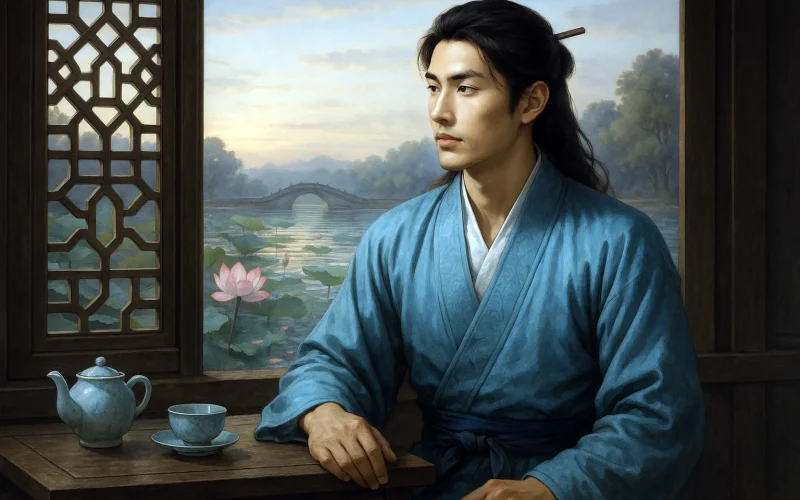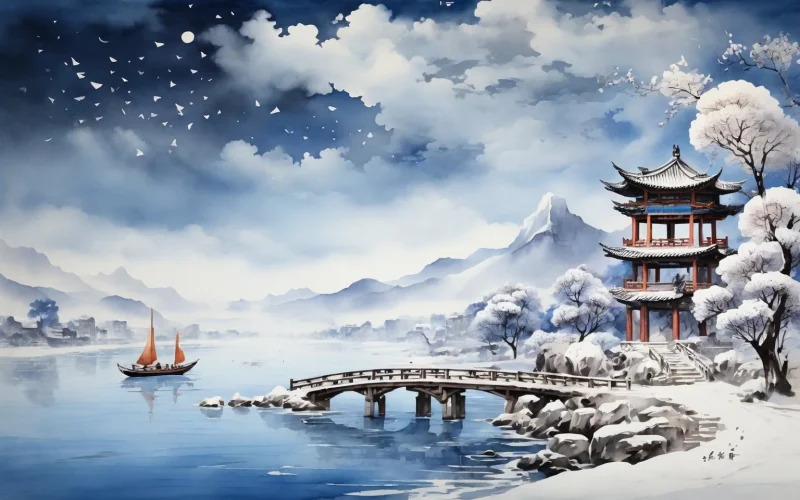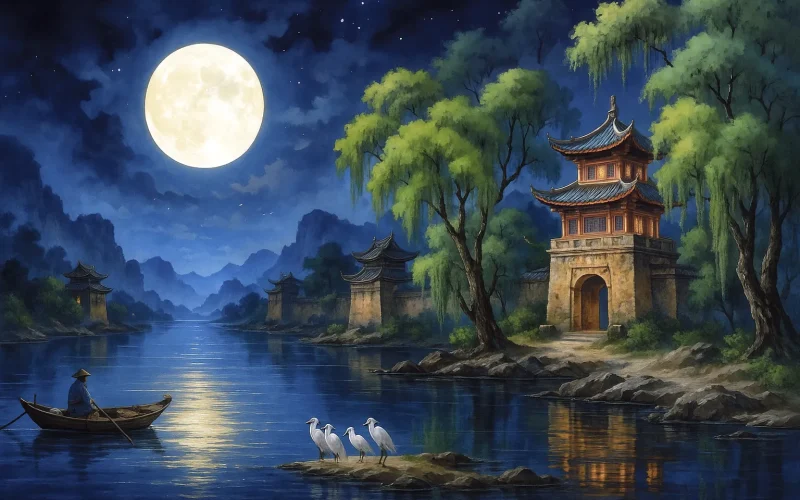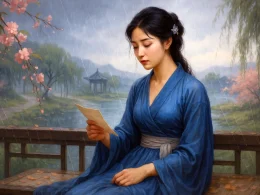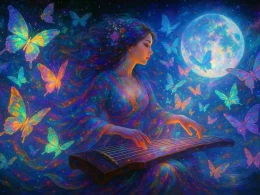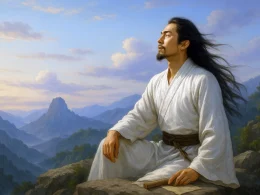Pillows invite coolness,
Lute and books beguile the hours—
I wake languid, drained of strength.
Fine sprays from icy springs,
A dagger slices emerald melons.
By the wall, someone calls for wine—
But who inquires after
The poet lodging south of town?
Silence.
High willows host cicadas at dusk,
Whispering news of the west wind.
Rainbow bridges span watery lanes,
Fish stir waves that waft fragrance—
Scarlet petals lie half-ruined.
Moored, I gaze afar:
My homeland looms dim in the northern sky.
Ah, these willows and sandbars—
Why can't I roam them with my beauty?
I ask: When shall we chant together
Of autumn hues on thirty-six lakes?
Original Poem
「惜红衣 · 吴兴荷花」
枕簟邀凉,琴书换日,睡余无力。
细洒冰泉,并刀破甘碧。
墙头唤酒,谁问讯、城南诗客。
岑寂,高柳晚蝉,说西风消息。虹梁水陌,鱼浪吹香,红衣半狼藉。
姜夔
维舟试望,故国渺天北。
可惜柳边沙外,不共美人游历。
问甚时同赋,三十六陂秋色?
Interpretation
Composed in the summer of 1187 during the Southern Song Dynasty, this ci poem was written when Jiang Kui resided in Wuxing (modern Huzhou, Zhejiang) under the patronage of Xiao Dezao. Wuxing, a picturesque water town interlaced with lakes and the Tiaozha rivers, was renowned for its lotus blossoms that captivated the poet during his wanderings. The immediate inspiration came when Jiang, traversing the Thousand Peaks of Bian Mountain, was deeply moved by the lotus flowers, stirring memories of past love. Originally prefaced by a note referencing the lotus' beauty and Chen Yuyi's line "lotus blossoms lined the path to bid farewell," the poem channels longing and solitude through floral imagery.
First Stanza: "枕簟邀凉,琴书换日,睡余无力。细洒冰泉,并刀破甘碧。墙头唤酒,谁问讯、城南诗客。岑寂,高柳晚蝉,说西风消息。"
Zhěn diàn yāo liáng, qín shū huàn rì, shuì yú wú lì. Xì sǎ bīng quán, bìng dāo pò gān bì. Qiáng tóu huàn jiǔ, shuí wèn xùn, chéng nán shī kè. Cén jì, gāo liǔ wǎn chán, shuō xī fēng xiāo xi.
On cool mats we court the breeze,
Lute and books beguile the hours—
Post-nap lethargy lingers.
Ice-clear spring water sprinkles fine,
A sharp knife splits honeyed melons.
Over the wall I call for wine—
Who checks on this poet south of town?
Silence.
High willows host twilight cicadas
Whispering autumn's advance.
This stanza paints a summer tableau of solitary leisure. The "cool mats" (枕簟) and "honeyed melons" (甘碧) evoke sensory respite, while the unanswered call for wine (唤酒) underscores isolation. The "twilight cicadas" (晚蝉) on high willows become heralds of seasonal change, their drone a prelude to the melancholy that follows.
Second Stanza: "虹梁水陌,鱼浪吹香,红衣半狼藉。维舟试望,故国渺天北。可惜柳边沙外,不共美人游历。问甚时同赋,三十六陂秋色?"
Hóng liáng shuǐ mò, yú làng chuī xiāng, hóng yī bàn láng jí. Wéi zhōu shì wàng, gù guó miǎo tiān běi. Kě xī liǔ biān shā wài, bù gòng měi rén yóu lì. Wèn shèn shí tóng fù, sān shí liù bēi qiū sè?
Arched bridges span liquid lanes,
Fish waves waft fragrance—
Red petals lie half ruined.
Moored, I gaze northward:
My homeland dissolves in distant skies.
Alas, by willows and sandy shores,
I roam without my fair one.
When might we chant together
Of autumn hues on thirty-six lakes?
Transitioning from scene to sentiment, the stanza contrasts vibrant scenery ("arched bridges," "fish waves") with decay ("half-ruined petals"). The poet's gaze toward the distant homeland (故国) blends geographical and emotional exile. The plaintive question—"When might we chant together?" (问甚时同赋)—transforms the "thirty-six lakes" (三十六陂) from physical landmarks into metaphors for irretrievable shared moments, fusing natural observation with unfulfilled desire.
Holistic Appreciation
The first stanza meticulously depicts the details of summer life, subtly conveying profound solitude without direct emotional expression. The second stanza shifts from scenery to sentiment, moving from admiring lotus blossoms to longing for a beloved, deepening the emotional resonance. The progression from "cherishing the red garments" (a metaphor for lotus flowers) to cherishing, remembering, and yearning for a person is masterful—though the word "sorrow" never appears, its presence lingers throughout. The structure is artfully uneven yet tightly woven, with natural transitions and rhythmic undulations that create powerful emotional impact.
Particularly noteworthy is the poet's "unsaid yet deeply felt" approach—restraining overt emotion while evoking poetic echoes through allusions like "calling for wine over the wall" and "the poet south of the city." Using the lotus as a symbol and the landscape as a medium, the poem achieves an artistic effect where "meaning extends beyond words" and "emotion resonates beyond expression." The restrained yet profound sentiment leaves readers with a lingering, melancholic aftertaste.
Artistic Merits
- Intricate Structure, Clear Emotional Thread: The first stanza lays out daily life and seasonal sensations, while the second delves into deeper emotion, transitioning seamlessly from the immediate to the distant, from scenery to human connection.
- Fresh Language, Elegant Style: Phrases like "inviting coolness," "exchanging daylight," and "gazing toward the northern sky" are inventive yet natural, showcasing the poet's originality.
- Meticulous Rhythm, Harmonious Sound and Emotion: The lyric's tune, composed by Jiang Kui himself, follows the Wuyi mode, employing oblique and entering tones throughout, creating an impassioned cadence that mirrors the emotional progression.
- Symbolic Lotus, Profound Meaning: The "red garments" symbolize lotus flowers but ultimately represent cherished memories and longing, using nature to express human emotion in a way that invites contemplation.
Insights
This lyric is not merely an ode to lotus blossoms but a poignant lament for the "unshared moments" in life. Through his depiction of everyday details and natural scenery, Jiang Kui channels personal solitude, regret, and deep affection, revealing the noble and compassionate spirit of classical literati. In today's fast-paced world, we too should learn to savor nature and reflect on life, cultivating a softer heart to perceive the delicate connections between people, events, time, and circumstance. Even in moments of helplessness, we may yet find solace and poetry in the "unspoken emotions" beyond words.
About the poet
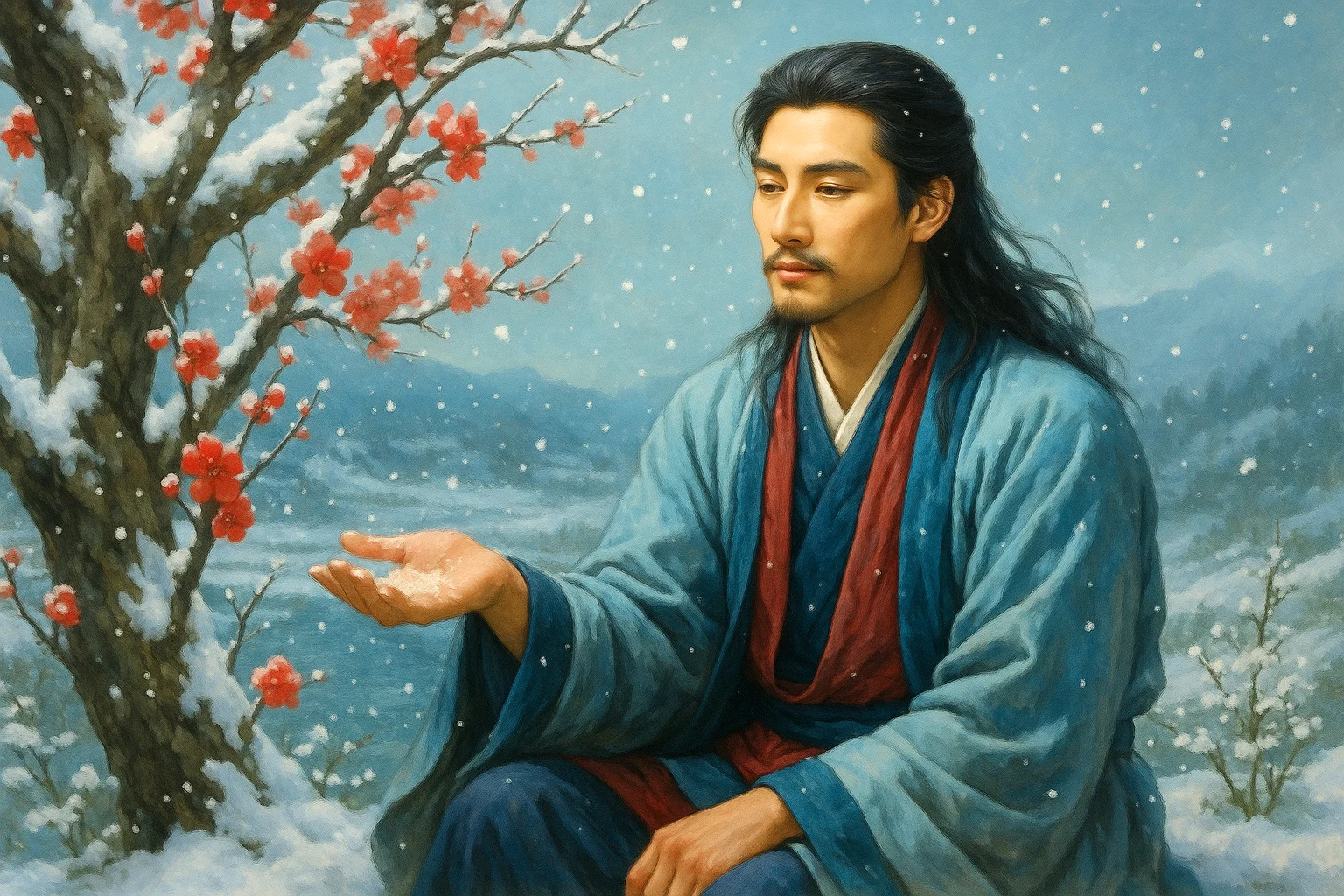
Jiang Kui (姜夔, c. 1155 - 1221), a native of Poyang, Jiangxi, was a Southern Song Dynasty lyric poet and musician. He remained a commoner throughout his life. His lyrics are known for their ethereal and austere style, and his poetry is also highly regarded. Along with Fan Chengda and Yang Wanli, he is celebrated as one of the "Four Great Masters of the Restoration."






